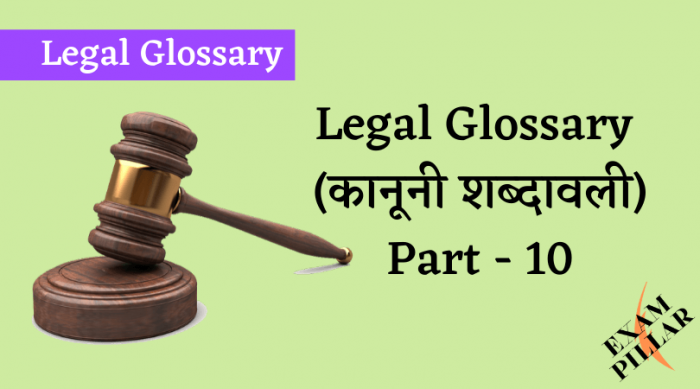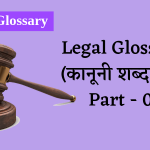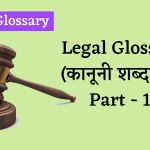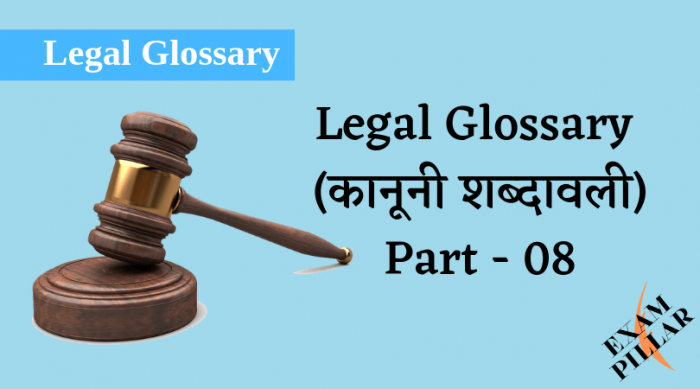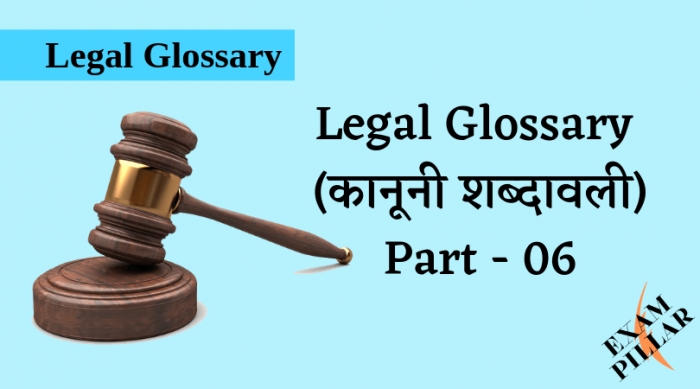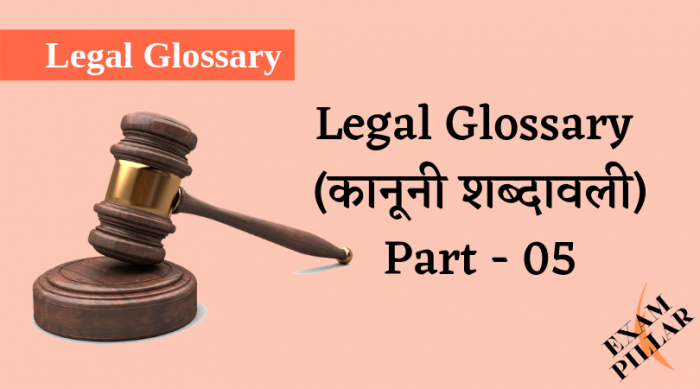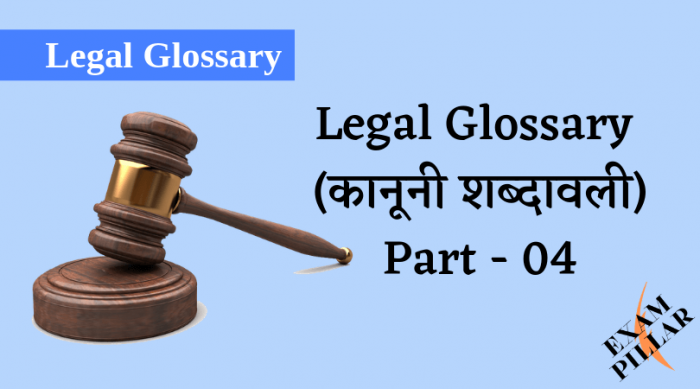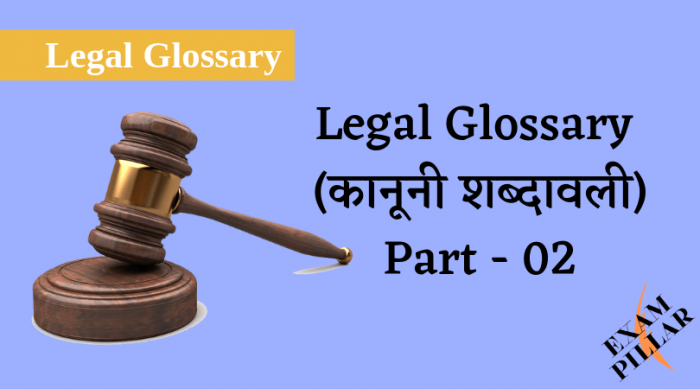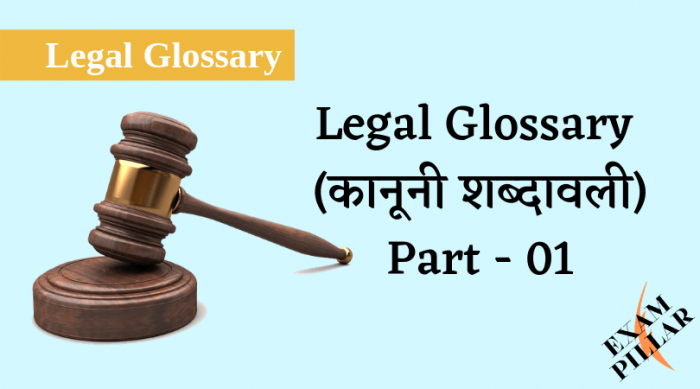Legal Glossary (कानूनी शब्दावली) का प्रयोग सामान्यत: उच्चतम न्यायालय (Supreme Court) और उच्च न्यायालय (High Court) में किया जाता है, इन्हीं न्यायालयों के द्वारा आयोजित की जाने वाली परीक्षाओं को ध्यान में रखते हुए यहाँ पर Legal Glossary (कानूनी शब्दावली) के कुछ शब्दों के बारे में हम जानेंगे। यह अध्याय कई भागों (Parts) में होगा, जिसमे 20-20 Legal Glossary (कानूनी शब्दावली) को जानेंगे। यह Legal Glossary (कानूनी शब्दावली) का भाग – 10 है।
Legal Glossary Part – 10
1. डीनोवो – किसी मुकद्दमे की नए सिरे से पुनः सुनवाई करना, जैसे कि पहले इसकी सुनवाई की ही न गई हो।
DE NOVO – Starting a case all over again as if it had not been heard before. In Latin, novo means “new.”
2. डिपोर्टेशन – किसी व्यक्ति को एक देश से दूसरे देश में भेजने की कार्यवाही। किसी इमिग्रेशन जज द्वारा जारी आदेश के आधार पर किसी अवैध नागरिक को संयुक्त राज्य अमेरिका से निष्कासित कर दिया जाता है। निष्कासन के कुछ परिणाम होते हैं जैसे कि वर्षों की संख्या जिसके अंदर वह निष्कासित व्यक्ति काननी रूप से पुनः वापिस नहीं आ सकता है। निर्धारित अवधि के समाप्त होने से पहले पुनः प्रवेश के कुछ आपराधिक परिणाम भी हैं।
DEPORTATION – The act of removing a person to another country. Order issued by an immigration judge, expelling an illegal resident from the United States. A deportation has certain consequences regarding the number of years within which a deportee may not legally immigrate. There are also criminal consequences for reentry within a prescribed time period.
3. डिस्कलेम – किसी वसीयतनामें में उल्लिखित तोहफे को स्वीकार करने से इंकार करना
DISCLAIM – To refuse a gift made in a will.
4. डिस्पोजीशन – किसी झगड़े में अदालत का अंतिम निर्णय।
DISPOSITION – The final decision by the court in a dispute.
5. डिस्सोल्यूशन – वह विवाह जो किसी जज के निर्णय द्वारा समाप्त कर दिया जाता है। इसे ‘डाईवोर्स (तलाक)’ भी कहा जाता है।
DISSOLUTION – A marriage that is ended by a judge’s decision, also known as a “divorce.”
6. डोकेट – किसी अदालत द्वारा सुने गए प्रत्येक मुकद्दमे का पूर्ण विवरण। इसमें उस अदालत की कार्यवाही का वैदिक क्रम संबंधी सार सम्मिलित होता है।
DOCKET – A record with the complete history of each case a court hears. It contains short chronological summaries of the court proceedings.
7. डि्यू – इसका प्रयोग कानूनी अदालतों कानूनी दस्तावेजों आदि में किसी ऐसे व्यक्ति के बारे में किया जाता है जिसके नाम का पता न हो।
DOE – Used in law courts, legal papers, etc., to refer to any person whose name is unknown.
8. ईज़मैंटस – किसी दूसरे की संपत्ति को प्रयोग करने का अधिकार।
EASEMENTS – A right of use over the property of another.
9. इलीज़र मोशन – वह प्रस्ताव जिसके द्वारा अभियोजन पक्ष को किसी मुखबिर का पता ठिकाना बतलाने के लिए कहा जाता है अथवा यह जताने के लिए कि उसे ढूंढने के लिए उचित प्रयास किए गए हैं।
ELEAZER MOTION – A motion to require prosecution to disclose the whereabouts of an informant or show that reasonable effort has been made to locate him.
10. इमैंसीपेशन – बच्चों के लिए 18 वर्ष की आयु से पहले व्यस्क बनने का कानूनी ढंग। एक बार जब बच्चे को बरी कर दिया जाता है तो उसके माता-पिता उस लड़के या लड़की को अपनी हिफाजत या नियंत्राण में नहीं लेते।
EMANCIPATION – A legal way for children to become adults before they are 18. Once a child is emancipated, his or her parents don’t have custody or control of him or her anymore.
11. ऐम्बैजल – किसी के उस धन अथवा संपत्ति को जानबूझ कर ले लेना अथवा अपने प्रयोग में लाना जिसे उस अपराधी ने शुरू में किसी पद, नौकरी अथवा किसी विश्वसनीय स्थिति के कारण कानूनी ढंग से हासिल किया था।
EMBEZZLE – To willfully take or convert to one’s own use, another’s money or property, which the wrongdoer initially acquired lawfully, because of some office, employment, or some position of trust.
12. ऐम्बैज़लमैंट – संपत्ति को उस व्यक्ति द्वारा हथिया लिया जाना जिसके पास यह अमानत के रूप में रखी गई थी।
EMBEZZLEMENT – Taking property by a person to whom the property has been entrusted.
13. ऐन्डोर्ज – किसी दस्तावेज की विषय वस्तु को अधिकृत अथवा हस्तांरित करने के लिए उस पर अपने नाम के हस्ताक्षर करना।
ENDORSE – To sign your name on a document to authorize its contents or transfer
14. ऐन्जौयनिंग – अदालत का वह आदेश जिसके द्वारा किसी व्यक्ति को कोई काम करने से रोका जाता है।
ENJOINING – An order by the court telling a person to stop something
15. ईक्विटी – वह कानून प्रणाली जो स्टैचुटरी और केस-लॉ की पूरक है और जो ‘क्या उचित और ठीक है’ के सिद्धांतों पर आधारित है।
EQUITY – A system of law that supplements the statutory and case law and is based on principles of what is “fair and right.”
16. ऐस्चीट – वह प्रक्रिया जिसके द्वारा किसी मृतक की संपत्ति राज्य को प्राप्त होती है यदि उसने कोई वसीयत न छोड़ी हो और उसका कोई वारिस न हो।
ESCHEAT (ES-CHET) – The process by which a deceased person’s property goes to the state if there is no will or no heirs.
17. ऐस्क्रो – धनराशि अथवा कोई लिखित दस्तावेज जैसे कि कोई इकरारनामा जो दोनों पक्षों के बीच सहमति से किसी तीसरे तटस्थ व्यक्ति के पास तब तक रखा रहता है जब तक की उसकी सारी शर्ते पूरी नहीं की जाती।
ESCROW – Money or a written instrument such as a deed that, by agreement between two parties, is held by a neutral third party (held in escrow) until all conditions of the agreement are met.
18. ऐस्टोपल – कोई ऐसी कार्यवाही अथवा ब्यान जो किसी व्यक्ति को बाद में विपरीत दावा करने से रोकता है।
ESTOPPEL – An act or statement that prevents a person from later making claims to the contrary.
19. ऐविक्शन – कानूनी प्रक्रिया द्वारा किसी से अपनी भूमि अथवा किराए पर ही गई संपत्ति खाली करवाना।
EVICTION – Recovery of land or rental property from another by legal process.
20. ऐक्सैसिव फोर्स – किसी पुलिस अधिकारी द्वारा अनुचित मात्रा में बल-प्रयोग।
EXCESSIVE FORCE – Use of unreasonable amount of force by police officer.
| Read Also : |
|---|

